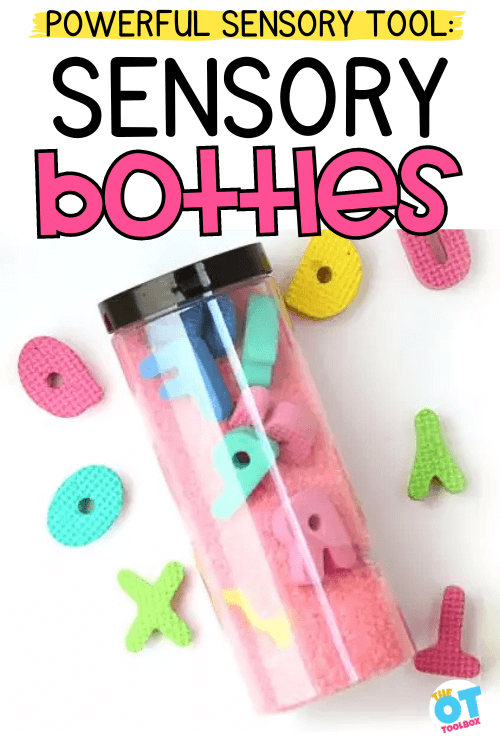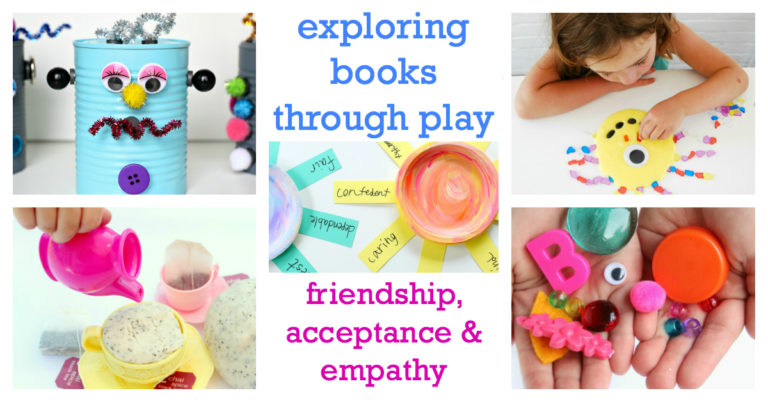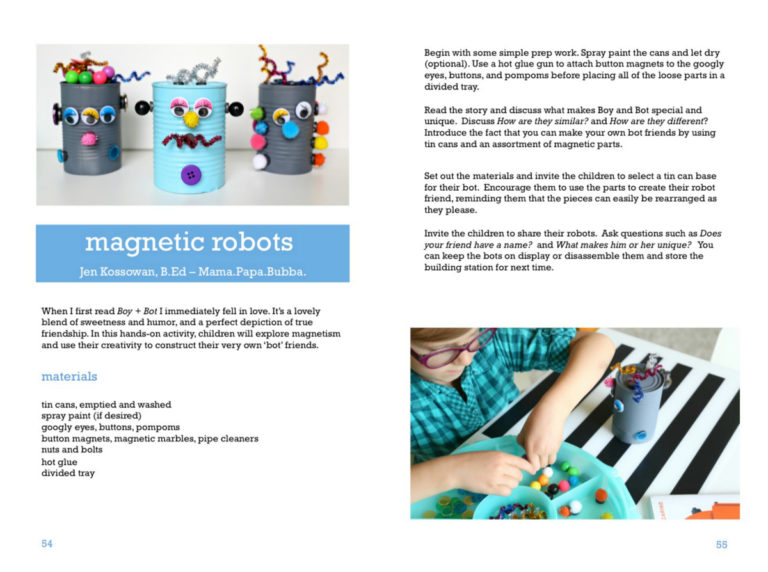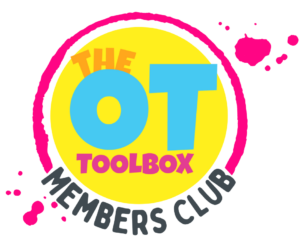Social emotional learning is defined as a process for helping children gain critical social skills for life effectiveness, such as developing positive relationships, behaving ethically, and handling challenging situations effectively. The specific skills that allow kids to function and complete daily occupations (such as play, learning, participating in social situations, rest, dressing, writing, riding a bike, interacting with others…) are those social emotional skills that help children to recognize and manage emotions, interact with others, think about their feelings and how they should act, and regulate behavior based on thoughtful decision making.
One piece of addressing underlying social emotional learning needs in kids is the fact that the behaviors that we see have an underlying cause that can be found as a result of regulation of emotions, making decisions, and acting on impulses. Social emotional skills are not always a cut and dry aspect of development.
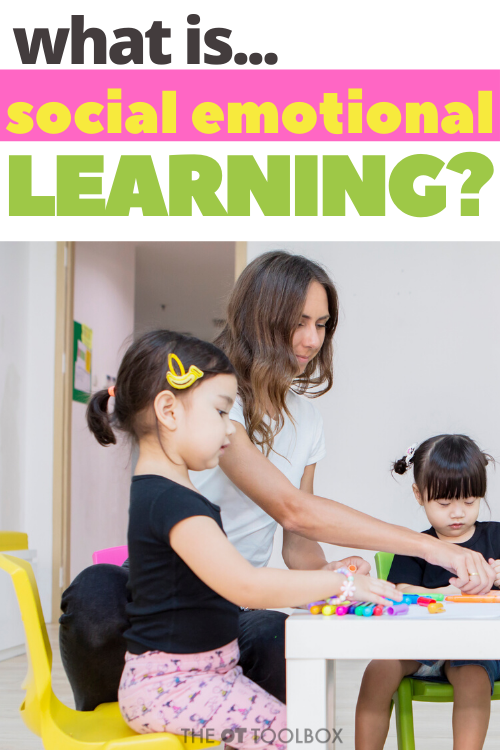
What is Social Emotional Learning?
Today, I wanted to expand on that idea. So many times, we run into children on our therapy caseloads or in our classroom (or hey, even in our own homes!) who struggle with one area…or several. Remembering that beneath the behaviors, troubles with transitions, acting out, irritability, sleep issues, inflexible thoughts, frustrations, etc…can be emotional regulation components.
Let’s consider some of the ways our kids may struggle with social and emotional competencies. We might see kids with difficulty in some of these occupational performance areas (occupational performance = the things we do…the tasks we perform):
- Academics/learning
- Management of stress in learning/chores/daily tasks
- Creating of personal goals in school work or personal interests and following through
- Making decisions based on ethical and social norms in play, learning, or work
- Understanding/Engaging in social expectations (social norms) in dressing, bathing, grooming, etc.
- Social participation
- Conflict resolution with friends
- Empathizing with others
- Responding to feedback in school, home, or work tasks
- Making good judgement and safety decisions in the community
- Showing manners
- Responding to the moods of others and reaching out to others as a support system (both an aspect of co-regulation skills)
- Understanding subtle social norms in the community or play
- Transitions in tasks in school or at home
- Ability to screen out input during tasks
- Cooperation in play and in group learning
- Considering context in communication
- Emotional control during games
- Understanding mood and affect and how this relates to behavioral responses
Wow! That list puts into perspective how our kids with regulation concerns really may be struggling. And, when you look at it from the flip-side, perhaps some of our children who struggle with, say, fine motor issues may have sensory concerns in the mix too.
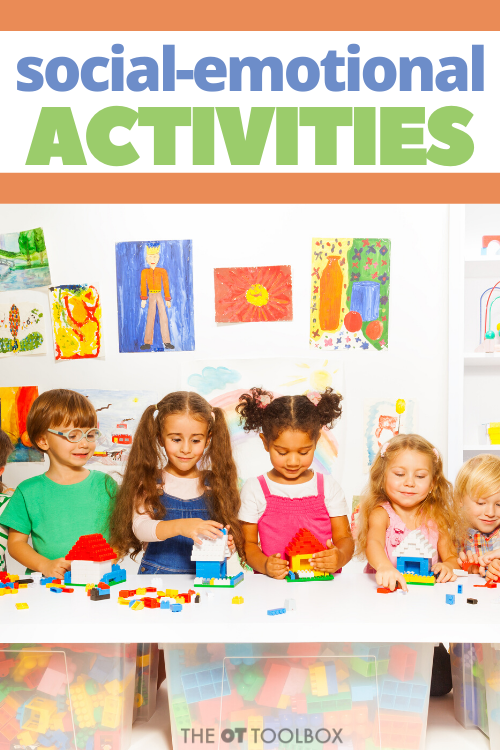
Social Emotional Learning Activities
When we equip our students with tools to identify their emotions and self-regulate, we are giving them tools for life and promoting a positive environment for learning. We can foster social emotional development through play and interactions.
What might this look like at home, in online schooling, or in a classroom setting?
1. Connect emotions to behavior- Children may not have the language knowledge or understand how to explain what they are feeling. They may need concrete examples or scenarios to help them understand how their emotions are tied to their behavior. Does a storm make them feel nervous or scared? How do they react when they feel anxious about a test or quiz? When they argue with a sibling, how do they react? Once they are able to understand their emotions and how they are feeling, they can start using emotional regulation tools and strategies.
Use this social emotional learning worksheet to help kids match emotions to behaviors and coping strategies.
2. Be flexible and patient- Flexibility is something we have all been thrown into more than usual lately. But working with children on emotional regulation and understanding their emotions takes patience and being flexible. You may need to change up how you introduce emotions, or maybe a strategy you thought would work isn’t.
3. Set the tone and share your own feelings- This may feel uncomfortable for some of us, but sharing our own feelings with our students and clients and modeling the responses and strategies we are encouraging them to use will have a huge impact.
4. Try specific social skills activities- Social skills activities are those that help kids build underlying emotional and regulation strategies so that making friends, emotions, kindness, empathy, self-awareness, self-management, and other socio emotional tools are built at the foundation. One way to do this is by setting up a system for an emotions check in or a feelings check in to start the day.
A recent post here on The OT Toolbox has more ideas to develop social emotional learning by engaging in activities that foster emotional regulation and executive functioning skills.
…it’s ALL connected!
Another fantastic resource that can help develop social and emotional skills is the activity book, Exploring Books Through Play.
This digital E-BOOK is an amazing resource for anyone helping kids learn about acceptance, empathy, compassion, and friendship. In Exploring Books through Play, you’ll find therapist-approved resources, activities, crafts, projects, and play ideas based on 10 popular children’s books. Each book covered contains activities designed to develop fine motor skills, gross motor skills, sensory exploration, handwriting, and more. Help kids understand complex topics of social/emotional skills, empathy, compassion, and friendship through books and hands-on play.
The book Exploring Books Through Play, has 50 different activities based on popular children’s books. Each book is used for 5 different activities that cover a variety of areas: sensory play, crafts, gross motor activities, fine motor activities, handwriting, scissor skills, and so much more.
This book is designed to address emotional regulation and connecting with kids.
What’s Inside Exploring Books through Play?
We have handpicked these easy and hands-on activities to help kids develop essential social emotional learning skills.
As classroom curriculum becomes more focused on academics, social and emotional development can get lost in the shuffle. This book focuses on abstract concepts of friendship, acceptance and empathy. By using children’s books that foster understanding of these concepts through pictures and stories, we can help children understand and see these emotions in action. What if you could use books and interactive activities to teach friendship? What if you could read a book that centers on accepting differences and create or make an activity or craft that helps children see acceptance in action. What if you could explore emotions through story and interactive play? In this book, you will find books that cover abstract concepts and use play to build social and developmental skills. The 10 books covered include:
- A Sick Day for Amos McGee
- Boy + Bot
- Little Blue and Little Yellow
- Red: A Crayon’s Story
- Chrysanthemum
- The Day the Crayons Quit
- Leonardo the Terrible Monster
- The Adventures of Beekle: The Unimaginary Friend
- Whoever You Are and Penguin and Pinecone
Want to help kids learn more about complex concepts such emotions, empathy, compassion, and differences?
Exploring Books Through Play uses children’s literature as a theme to engage in fun, hands-on activities that help children and adults delve deeper into the characters and lessons, bringing the stories to life and falling further in love with literature. Read a story and then bring the characters to life while learning and building skills. Each story offers unique activities designed around central themes of friendship, empathy, and compassion.
Each chapter includes 5 activities for each of the 10 children’s books. The activities are perfect for children ages 3-8, can be used in small groups or as a whole class, and are easily adapted to a home or classroom setting.
Click here to get the Exploring Books Through Play resource.
Hopefully, this resource, and these suggestions to support social emotional learning has been helpful. Remember that fostering SE development across the ages and stages fosters learning, educational participation, and functional performance in all contexts and environments. Specifically, social emotional learning is important to consider when creating self regulation IEP goals or when fostering self regulation and emotional regulation needs in the school environment.

Colleen Beck, OTR/L has been an occupational therapist since 2000, working in school-based, hand therapy, outpatient peds, EI, and SNF. Colleen created The OT Toolbox to inspire therapists, teachers, and parents with easy and fun tools to help children thrive. Read her story about going from an OT making $3/hour (after paying for kids’ childcare) to a full-time OT resource creator for millions of readers. Want to collaborate? Send an email to contact@theottoolbox.com.

